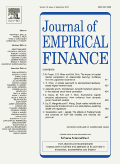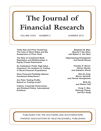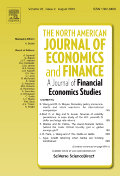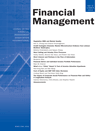
Journal of Investment Strategies
Scope & Guideline
Navigating the Complexities of Economic Dynamics
Introduction
Aims and Scopes
- Investment Strategy Development:
The journal emphasizes the development and analysis of various investment strategies, focusing on empirical evidence and theoretical frameworks that support effective portfolio management. - Market Behavior and Dynamics:
Research exploring market dynamics, including investor sentiment, volatility, and behavioral finance, is a core area of focus, revealing insights into how these factors influence investment performance. - Asset Allocation and Diversification:
The journal covers studies on asset allocation techniques, diversification strategies, and their implications for risk management, particularly in complex financial environments. - Innovative Financial Instruments:
Explorations of new financial instruments, including cryptocurrencies, alternatives, and derivatives, are highlighted, reflecting the journal's commitment to addressing emerging trends in the investment landscape. - Quantitative and Empirical Analysis:
A strong emphasis on quantitative methodologies, including statistical modeling and empirical testing, underpins much of the research published, contributing to the journal's reputation for rigorous analysis.
Trending and Emerging
- Alternative Investments:
There is a growing trend toward exploring alternative investments, such as luxury assets and cryptocurrencies, signaling a shift in investor interest towards non-traditional asset classes. - Behavioral Finance and Market Sentiment:
Research examining the influence of investor sentiment and behavioral finance on market volatility and investment decisions is gaining traction, indicating a deeper exploration of psychological factors in finance. - Dynamic Risk Management Strategies:
The focus on dynamic and adaptive risk management strategies reflects the need for investors to manage portfolios in increasingly volatile and uncertain market conditions. - Integration of Technology in Trading:
The rise of technology-driven trading solutions, including algorithmic trading and experimental economics, is emerging as a significant theme, reflecting the impact of technological advancements on investment practices. - Interdisciplinary Approaches:
There is an increasing trend towards interdisciplinary research that combines finance with insights from economics, data science, and behavioral studies, enriching the understanding of investment strategies.
Declining or Waning
- Traditional Equity Analysis:
Research focused solely on traditional equity analysis methods appears to be waning, possibly due to the increasing interest in alternative assets and innovative investment strategies. - Static Portfolio Management Techniques:
Studies that employ static or traditional portfolio management techniques are becoming less frequent as practitioners and researchers seek more dynamic and adaptive strategies in response to market changes. - Historical Performance Analysis:
While historical performance analysis remains relevant, the focus on retrospective studies without actionable insights or contemporary applications is decreasing, as the journal shifts towards more forward-looking research.
Similar Journals

Journal of Empirical Finance
Transforming finance with robust, data-driven analysis.Journal of Empirical Finance, published by Elsevier, stands as a key resource in the areas of finance and economics, with a definitive focus on empirical studies. As a prominent journal since its inception in 1993, it has made significant strides in contributing to the academic community, evidenced by its soaring categorization in Q1 for Finance and Q2 for Economics and Econometrics as of 2023. With an ISSN of 0927-5398 and an E-ISSN of 1879-1727, the journal emphasizes robust, data-driven analysis to inform both theoretical and practical aspects of financial research. While access options do not include open access, the journal ensures that its content remains accessible to a diverse audience of researchers, professionals, and students. It fosters a platform for innovative research and discourse, significantly impacting the fields of finance, economics, and econometrics. The Scopus rankings further bolster its reputation, placing it in the 61st percentile in both categories, reflecting a commitment to high-quality research output. As the journal continues to evolve, it invites contributions that push the boundaries of empirical finance, enabling a deeper understanding of financial mechanisms that drive global economies.

Probability Uncertainty and Quantitative Risk
Bridging Theory and Practice in Quantitative RiskProbability Uncertainty and Quantitative Risk, published by the American Institute of Mathematical Sciences (AIMS), is a distinguished open-access journal that has been contributing to the academic community since its inception in 2016. With a focus on the crucial interplay between probability, uncertainty, and quantitative risk assessment, this journal serves as a vital platform for researchers, practitioners, and students engaged in the fields of Applied Mathematics and Statistics. The journal's ranking in the Q2 category for both Applied Mathematics and Statistics and Probability reflects its growing influence and relevance, while its diverse scope encourages interdisciplinary studies. As a part of the Scopus database and maintaining a consistent publication pace through 2024, Probability Uncertainty and Quantitative Risk is essential for anyone looking to remain at the forefront of research in risk analysis and uncertainty modeling. Its commitment to open access since 2016 further enhances accessibility to cutting-edge findings, making it an indispensable resource for academics and industry professionals alike.

JOURNAL OF FINANCIAL RESEARCH
Charting New Territories in Financial InquiryThe JOURNAL OF FINANCIAL RESEARCH, published by WILEY, stands as a pivotal platform for disseminating innovative research in the fields of finance and accounting since its inception in 1978. With an ISSN of 0270-2592 and an E-ISSN of 1475-6803, this journal aims to address contemporary challenges and trends within the financial research landscape. It has achieved notable recognition, being placed in the Q2 category for both Finance and Accounting in the 2023 rankings, signifying its relevance and impact within the academic community. Although it does not currently offer open access, the journal is accessible through various academic databases, catering to a diverse audience of researchers, professionals, and students keen on advancing their knowledge and understanding of financial systems and methodologies. With an evolving scope that encompasses empirical studies, theoretical frameworks, and practical applications, the JOURNAL OF FINANCIAL RESEARCH is committed to contributing valuable insights into the complexities of financial practices and policies.

Financial Innovation
Advancing the Future of Finance and TechnologyFinancial Innovation, published by Springer, is a premier open access journal that has been contributing to the fields of finance and management of technology and innovation since its inception in 2015. With an impressive Q1 category ranking in both Finance and Management of Technology and Innovation, the journal places itself at the forefront of academic research, reflected in its Scopus rankings—#17 out of 317 in Finance (94th percentile) and #29 out of 289 in Management of Technology and Innovation (90th percentile). Centered in Germany, this journal aims to disseminate high-quality research that fosters theoretical and practical advancements within its scope, encouraging exchanges between academia and industry. The open access model enhances visibility and accessibility of published research, thus playing a critical role in shaping the future of financial practices and technology management. For researchers, professionals, and students alike, Financial Innovation remains essential for staying abreast of cutting-edge developments and trends in these dynamic fields.

North American Journal of Economics and Finance
Pioneering research for a dynamic economic landscape.The North American Journal of Economics and Finance is a premier academic journal published by Elsevier Science Inc. since 1992, dedicated to advancing the field of economics and finance through rigorous research and scholarship. With an impressive impact factor and recognition in the Q2 category for Economics and Econometrics and Q1 for Finance as of 2023, this journal holds a significant position in the academic community, ranked #41 out of 317 in Finance and #100 out of 716 in Economics. The journal features high-quality, peer-reviewed articles that cover a broad range of topics, from theoretical frameworks to empirical analyses and practical applications. Though not an open-access platform, the journal provides valuable insights for researchers, practitioners, and students alike, promoting knowledge dissemination in the dynamic landscape of economic and financial studies. With its commitment to excellence, the North American Journal of Economics and Finance serves as an essential resource for those seeking to deepen their understanding of contemporary issues in these critical fields.

FINANCIAL MANAGEMENT
Elevating Standards in Financial Discourse and PracticeFINANCIAL MANAGEMENT is a premier academic journal published by Wiley, focusing on the intricate domains of Accounting, Economics, and Finance. With an ISSN of 0046-3892 and an E-ISSN of 1755-053X, this esteemed journal has made significant contributions to the global discourse on financial practices and theories since its establishment in 1996. Situated within the top tier (Q1) in its respective fields, FINANCIAL MANAGEMENT ranks impressively in Scopus, positioned at 30 out of 176 in Accounting and 57 out of 317 in Finance, reflecting its high impact and relevance in the scholarly community. The journal is known for its rigorous peer-review process and publishes cutting-edge research aimed at advancing knowledge and practice in financial management. Although it does not offer Open Access, it remains accessible through institutional subscriptions, ensuring that researchers, professionals, and students remain at the forefront of developments in financial management. With a commitment to excellence, FINANCIAL MANAGEMENT continues to be an indispensable resource for those seeking to deepen their understanding of this critical field.

Journal of Investment Management
Advancing Knowledge in the Dynamic World of Investment Management.The Journal of Investment Management, with ISSN 1545-9144 and E-ISSN 1545-9152, is a prominent platform dedicated to the dissemination of cutting-edge research in the field of investment management. Published by JOURNAL INVESTMENT MANAGEMENT, this journal aims to bridge the gap between theoretical foundations and practical applications, catering to the needs of researchers, professionals, and students alike. With a focus on contemporary issues influencing investment strategies, asset allocation, risk management, and financial innovation, this journal provides valuable insights and methodologies to enhance investment decision-making processes. While currently not operating under an open-access model, the journal is accessible through various academic databases, ensuring that its critical findings reach a wide audience across the globe. Emphasizing the significance of empirical research and analytical rigor, the Journal of Investment Management plays a crucial role in shaping the future of investment practices and academic discourse in this dynamic field.

Annals of Finance
Navigating Financial Landscapes with Scholarly PrecisionThe Annals of Finance, published by Springer Heidelberg in Germany, stands as a pivotal journal within the realms of Economics, Econometrics, and Finance. With a dedicated convergence of research from 2005 to 2024, this esteemed publication features thought-provoking articles that address both theoretical and practical aspects of finance, earning it a commendable Q2 category ranking in the 2023 metrics for both Economics, Econometrics and Finance as well as Finance. The journal serves an essential role in disseminating knowledge and fostering advancements in the field, appealing to researchers, professionals, and students alike. Its rigorous peer-review process ensures the integrity and quality of published works, making it a reliable source for cutting-edge findings and discussions within the finance community. For those looking to navigate the complexities of modern finance through rigorous research, the Annals of Finance is an invaluable resource.

Journal of Risk
Advancing Knowledge in Finance and StrategyJournal of Risk, published by INCISIVE MEDIA, serves as an essential platform for scholars and practitioners in the fields of finance and strategic management. With an ISSN of 1465-1211 and an E-ISSN of 1755-2842, this journal explores the multifaceted nature of risk, encompassing theoretical frameworks, empirical investigations, and practical applications. Although currently classified in Q4 for both Finance and Strategy and Management categories as per 2023 standards, it provides a crucial forum for innovative research and thought leadership, addressing the challenges faced in understanding and managing risk in today’s dynamic environment. The journal, based in the United States, is committed to advancing knowledge and offering a platform for debate and dialogue in its convergence years from 2011 to 2024. Researchers, professionals, and students are encouraged to contribute their insights to enhance the academic discourse surrounding risk management.

International Journal of Financial Studies
Championing accessible research in the world of finance.The International Journal of Financial Studies is a premier publication dedicated to advancing the field of finance through open-access research. Published by MDPI based in Switzerland, this journal offers researchers, professionals, and students a platform to disseminate their findings in an accessible format since its establishment in 2013. With its ISSN of 2227-7072 and a commendable impact reflected in its Q2 ranking in finance, it occupies an influential position among finance-related journals, as evidenced by its 65th percentile rank in Scopus. The journal encompasses a wide array of topics in finance, making it essential reading for those seeking to stay abreast of current research trends and methodologies. As an open-access journal, all articles are freely available, significantly enhancing the visibility and reach of published studies, which is crucial for fostering collaboration and innovation within the global financial community. Published continuously until 2024, the International Journal of Financial Studies is not just a source of knowledge; it is a critical contributor to the progression of financial scholarship.